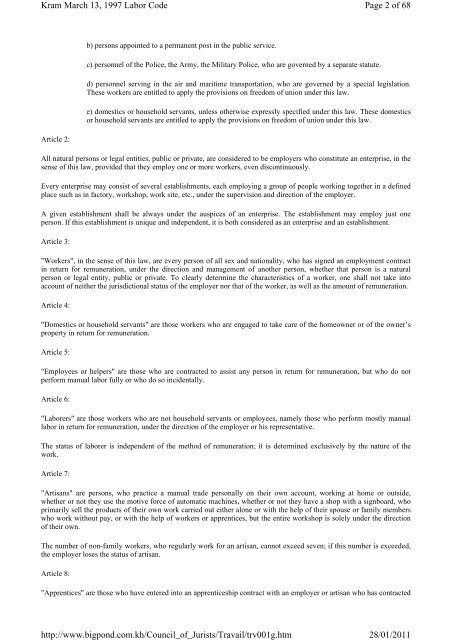Labour Law of 13 March 1997, English [pdf - International Labour ...
Labour Law of 13 March 1997, English [pdf - International Labour ...
Labour Law of 13 March 1997, English [pdf - International Labour ...
You also want an ePaper? Increase the reach of your titles
YUMPU automatically turns print PDFs into web optimized ePapers that Google loves.
Kram <strong>March</strong> <strong>13</strong>, <strong>1997</strong> Labor Code<br />
Article 2:<br />
b) persons appointed to a permanent post in the public service.<br />
c) personnel <strong>of</strong> the Police, the Army, the Military Police, who are governed by a separate statute.<br />
d) personnel serving in the air and maritime transportation, who are governed by a special legislation.<br />
These workers are entitled to apply the provisions on freedom <strong>of</strong> union under this law.<br />
e) domestics or household servants, unless otherwise expressly specified under this law. These domestics<br />
or household servants are entitled to apply the provisions on freedom <strong>of</strong> union under this law.<br />
All natural persons or legal entities, public or private, are considered to be employers who constitute an enterprise, in the<br />
sense <strong>of</strong> this law, provided that they employ one or more workers, even discontinuously.<br />
Every enterprise may consist <strong>of</strong> several establishments, each employing a group <strong>of</strong> people working together in a defined<br />
place such as in factory, workshop, work site, etc., under the supervision and direction <strong>of</strong> the employer.<br />
A given establishment shall be always under the auspices <strong>of</strong> an enterprise. The establishment may employ just one<br />
person. If this establishment is unique and independent, it is both considered as an enterprise and an establishment.<br />
Article 3:<br />
"Workers", in the sense <strong>of</strong> this law, are every person <strong>of</strong> all sex and nationality, who has signed an employment contract<br />
in return for remuneration, under the direction and management <strong>of</strong> another person, whether that person is a natural<br />
person or legal entity, public or private. To clearly determine the characteristics <strong>of</strong> a worker, one shall not take into<br />
account <strong>of</strong> neither the jurisdictional status <strong>of</strong> the employer nor that <strong>of</strong> the worker, as well as the amount <strong>of</strong> remuneration.<br />
Article 4:<br />
"Domestics or household servants" are those workers who are engaged to take care <strong>of</strong> the homeowner or <strong>of</strong> the owner’s<br />
property in return for remuneration.<br />
Article 5:<br />
"Employees or helpers" are those who are contracted to assist any person in return for remuneration, but who do not<br />
perform manual labor fully or who do so incidentally.<br />
Article 6:<br />
"Laborers" are those workers who are not household servants or employees, namely those who perform mostly manual<br />
labor in return for remuneration, under the direction <strong>of</strong> the employer or his representative.<br />
The status <strong>of</strong> laborer is independent <strong>of</strong> the method <strong>of</strong> remuneration; it is determined exclusively by the nature <strong>of</strong> the<br />
work.<br />
Article 7:<br />
"Artisans" are persons, who practice a manual trade personally on their own account, working at home or outside,<br />
whether or not they use the motive force <strong>of</strong> automatic machines, whether or not they have a shop with a signboard, who<br />
primarily sell the products <strong>of</strong> their own work carried out either alone or with the help <strong>of</strong> their spouse or family members<br />
who work without pay, or with the help <strong>of</strong> workers or apprentices, but the entire workshop is solely under the direction<br />
<strong>of</strong> their own.<br />
The number <strong>of</strong> non-family workers, who regularly work for an artisan, cannot exceed seven; if this number is exceeded,<br />
the employer loses the status <strong>of</strong> artisan.<br />
Article 8:<br />
Page 2 <strong>of</strong> 68<br />
"Apprentices" are those who have entered into an apprenticeship contract with an employer or artisan who has contracted<br />
http://www.bigpond.com.kh/Council_<strong>of</strong>_Jurists/Travail/trv001g.htm<br />
28/01/2011

















